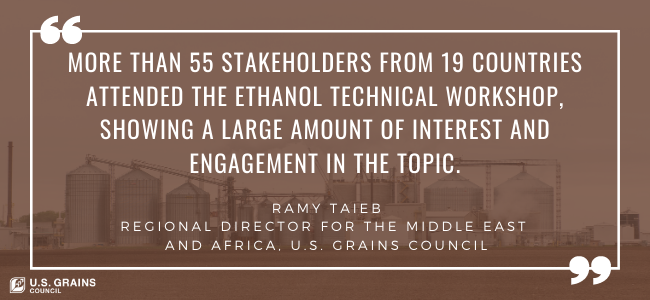The U.S. Grains Council (USGC) teamed up with General Motors and SGS, the world’s leading inspection, verification, testing and certification company, to conduct a virtual ethanol workshop in mid-September focused on policy, blending mandates and handling.
The program provided a forum for in-depth discussions with key importers and stakeholders in the Middle East, Africa and Europe ahead of the Council’s Virtual Ethanol Buyers Conference (VEBC) on Sept. 23.
The workshop included information about E10 policy adoption in the region as well as the technical requirements for blending ethanol, handling and transportation. Speakers addressed how to best address water contamination and phase separation and vehicle compatibility, as well as how markets like the Philippines have successfully set up ethanol blending mandates with a role for trade.
“More than 55 stakeholders from 19 countries attended the ethanol technical workshop, showing a large amount of interest and engagement in the topic,” said Ramy Taieb, USGC regional director for the Middle East and Africa. “This workshop is part of the Council’s continuous communication with regional counterparts to sustain and engage efforts to support increased global use of ethanol.”
The Middle East, Africa and Europe accounted for 14 percent of U.S. ethanol exports in the 2019/2020 marketing year, totaling around 194 million gallons (68.8 million in corn bushel equivalent). Imported ethanol was used for both fuel and industrial purposes. Top markets included 69 million gallons to the Netherlands, 35 million gallons to Nigeria, 28 million gallons to the United Kingdom and 25 million gallons to the Arabian Peninsula (mainly United Arab Emirates, Oman and Kingdom of Saudi Arabia).
The Council’s regional office in Tunis actively operates programs on developing or expanding ethanol use in more than 20 countries and in Europe. Efforts focus on increasing the value of ethanol in the region, especially as individual countries work to meet commitments to reduce greenhouse gas (GHG) emissions under the Paris Agreement.
Ethanol provides a pathway to meeting these commitments by reducing the carbon intensity of transportation fuels. According to the U.S. Department of Agriculture (USDA), corn ethanol will reduce GHG emissions by 50 percent by 2022 compared to conventional gasoline.
Following this successful workshop and the VEBC, the Council plans to continue organizing regional workshops on the environmental and air quality benefits of ethanol.
Learn more about the Council’s work to promote the use of ethanol.
About The U.S. Grains Council
The U.S. Grains Council develops export markets for U.S. barley, corn, sorghum and related products including distiller’s dried grains with solubles (DDGS) and ethanol. With full-time presence in 28 locations, the Council operates programs in more than 50 countries and the European Union. The Council believes exports are vital to global economic development and to U.S. agriculture’s profitability. Detailed information about the Council and its programs is online at www.grains.org.

